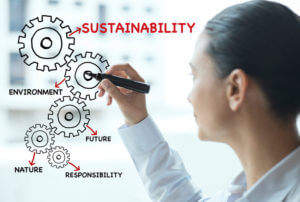 Whether a multinational commercial company or a local private business, organizations who cultivate green practices often stand out as being unique. Other times, the differences in an energy-efficient business may seem imperceptibly small, yet they are largely effective. Either way, you’re not alone.
Whether a multinational commercial company or a local private business, organizations who cultivate green practices often stand out as being unique. Other times, the differences in an energy-efficient business may seem imperceptibly small, yet they are largely effective. Either way, you’re not alone.
Developing a strong energy-efficient business strategy helps an enterprise make valuable investment decisions that drive ROI, transform operations for improved building performance and define its role in environmental stewardship. At KMB, our professional energy engineering staff specialize in a wide variety of energy consulting services to help enterprises identify possible consequences of their current practices and develop their own green strategies that extend beyond the four walls of their own business.
While we recognize that every case is unique, we have put together 4 main considerations when forming the basis of any energy-efficient business strategy.
4 Energy-Efficient Business Strategy Considerations
1. Identify Key Performance Indicators
As with any new business strategy, key performance indicators must first be identified to formulate a green strategic vision. From daily energy usage and solar energy savings to weight of scrap material used during the construction phase, implementing an energy impact measurement system allows an organization to establish baseline performance data. This data will be used to begin setting improvement targets toward key performance indicators and integrate energy-efficiency into the company’s vision.
2. Assess Operations
Once key performance indicators have been identified, an enterprise must assess their current state of sustainable operations and green practices to provide a baseline from which to measure the effectiveness of improvements. To formulate an actionable transformation roadmap with the assessment, consider future goals and define how the assessment compares with other similar companies. These answers will reveal any energy gaps and retrofit opportunities.
3. Reduce Waste (ful behavior)
Make energy efficiency a priority by setting public targets that signal the firm’s commitment to external stakeholders, drive accountability and inspire employees. Consider weaving energy-efficient incentives into the strategy to make energy an operational priority and drive the development of green capabilities without sacrificing quality.
4. Monitor Progress
Considering many initiatives for energy-efficient business practices led to new services and revenue growth, or additional efficiencies and cost reductions, ongoing monitoring is a must. Track progress and manage transformation improvements to build support from senior management and quantify ROI.
Refreshing this step regularly will also allow an organization to assess timing considerations, identify alternate approaches and quantify the benefits of the engineered solutions.
Energy-Efficient Business Monitoring Services
Among the difficult challenges companies face today is understanding how the benefits will directly affect their own operations. But, increasingly, organizations are starting to identify new opportunities and learn that being efficient, lean and “green” simultaneously help to reduce costs, lead to revenue growth and improve environmental stewardship. The environmentally sustainable and energy efficient business transformations will only continue to strengthen.
Companies who do not consider green opportunities in a strategic context miss out on these significant benefits. Not sure where to get started?
Contact your trusted Energy Engineering Partners at KMB to deliver your desired energy savings results.